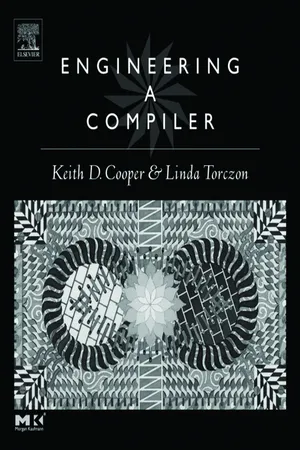
- 801 pages
- English
- PDF
- Available on iOS & Android
eBook - PDF
Engineering a Compiler
About this book
The proliferation of processors, environments, and constraints on systems has cast compiler technology into a wider variety of settings, changing the compiler and compiler writer's role. No longer is execution speed the sole criterion for judging compiled code. Today, code might be judged on how small it is, how much power it consumes, how well it compresses, or how many page faults it generates. In this evolving environment, the task of building a successful compiler relies upon the compiler writer's ability to balance and blend algorithms, engineering insights, and careful planning. Today's compiler writer must choose a path through a design space that is filled with diverse alternatives, each with distinct costs, advantages, and complexities. Engineering a Compiler explores this design space by presenting some of the ways these problems have been solved, and the constraints that made each of those solutions attractive. By understanding the parameters of the problem and their impact on compiler design, the authors hope to convey both the depth of the problems and the breadth of possible solutions. Their goal is to cover a broad enough selection of material to show readers that real tradeoffs exist, and that the impact of those choices can be both subtle and far-reaching. Authors Keith Cooper and Linda Torczon convey both the art and the science of compiler construction and show best practice algorithms for the major passes of a compiler. Their text re-balances the curriculum for an introductory course in compiler construction to reflect the issues that arise in current practice.
- Focuses on the back end of the compiler—reflecting the focus of research and development over the last decade.
- Uses the well-developed theory from scanning and parsing to introduce concepts that play a critical role in optimization and code generation.
- Introduces the student to optimization through data-flow analysis, SSA form, and a selection of scalar optimizations.
- Builds on this background to teach modern methods in code generation: instruction selection, instruction scheduling, and register allocation.
- Presents examples in several different programming languages in order to best illustrate the concept.
- Provides end-of-chapter exercises.
Tools to learn more effectively

Saving Books

Keyword Search

Annotating Text

Listen to it instead
Information
Table of contents
- Contents
- Preface
- 1. Overview of Compilation
- 2. Scanning
- 3. Parsing
- 4. Context-Sensitive Analysis
- 5. Intermediate Representations
- 6. The Procedure Abstraction
- 7. Code Shape
- 8. Introduction to Code Optimization
- 9. Data-Flow Analysis
- 10. Scalar Optimizations
- 11. Instruction Selection
- 12. Instruction Scheduling
- 13. Register Allocation
- Appendix A: ILOC
- Appendix B: Data Structures
- Exercises
- Index
Frequently asked questions
Yes, you can cancel anytime from the Subscription tab in your account settings on the Perlego website. Your subscription will stay active until the end of your current billing period. Learn how to cancel your subscription
No, books cannot be downloaded as external files, such as PDFs, for use outside of Perlego. However, you can download books within the Perlego app for offline reading on mobile or tablet. Learn how to download books offline
Perlego offers two plans: Essential and Complete
- Essential is ideal for learners and professionals who enjoy exploring a wide range of subjects. Access the Essential Library with 800,000+ trusted titles and best-sellers across business, personal growth, and the humanities. Includes unlimited reading time and Standard Read Aloud voice.
- Complete: Perfect for advanced learners and researchers needing full, unrestricted access. Unlock 1.4M+ books across hundreds of subjects, including academic and specialized titles. The Complete Plan also includes advanced features like Premium Read Aloud and Research Assistant.
We are an online textbook subscription service, where you can get access to an entire online library for less than the price of a single book per month. With over 1 million books across 990+ topics, we’ve got you covered! Learn about our mission
Look out for the read-aloud symbol on your next book to see if you can listen to it. The read-aloud tool reads text aloud for you, highlighting the text as it is being read. You can pause it, speed it up and slow it down. Learn more about Read Aloud
Yes! You can use the Perlego app on both iOS and Android devices to read anytime, anywhere — even offline. Perfect for commutes or when you’re on the go.
Please note we cannot support devices running on iOS 13 and Android 7 or earlier. Learn more about using the app
Please note we cannot support devices running on iOS 13 and Android 7 or earlier. Learn more about using the app
Yes, you can access Engineering a Compiler by Keith D. Cooper,Linda Torczon in PDF and/or ePUB format, as well as other popular books in Economics & Decision Making. We have over one million books available in our catalogue for you to explore.